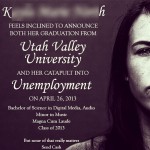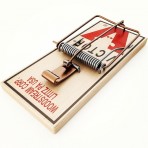Twitter Summary: Do you possess a worthless degree? You’re not alone.
Principle
Towards the end of Ken Robinson’s book, The Element, he makes a statement that will resonate with anyone who has gone through a Western public education system and felt like they ended up with a worthless degree. He writes, “Of course, many people do well in their schools and love what they have to offer. But too many graduate or leave early, unsure of their real talents and not knowing what direction to take next. Too many feel that what they’re good at isn’t valued by schools. Too many think they’re not good at anything.”
Robinson goes on to offer a few recommendations for this problem. “The most powerful method of improving education is to invest in the improvement of teaching and the status of great teachers.”
He adds that we need to personalize education, “to build achievement on discovering the individual talents of each child, to put students in an environment where they want to learn and where they can naturally discover their true passion.”
Lastly, he suggests a solution that is likely seen as a threat to the common core concept, “the future for education is not in standardizing but in customizing; not in promoting groupthink and ‘deindividuation’ but in cultivating the real depth and dynamism of human abilities of every sort.”
Worthless Degrees and Making Connections
Robinson’s comments resonate with me because I feel like after college, I didn’t feel like I had come to know what my real talents were and I didn’t feel like I had been mentored to become good at anything. I love how Robinson highlights in his book in a later section that some people don’t go on to do great things until after they recuperate from the effects of the education system. For me, it wasn’t until I was in graduate school working on a master’s degree that I felt like I knew exactly what I enjoyed studying and even then it wasn’t until the last year of that program that I really felt like I narrowed down my focus to something I enjoyed.
 But, how many people have felt exactly how Robinson describes – unsure of their real talent and don’t know what to do next? Considering the unemployment rates in the U.S. right now, specifically the number of degree holders who are unemployed, the feeling should be well-known to a large number of people right now. Graduating from college seems to have lost any meaning for some.
But, how many people have felt exactly how Robinson describes – unsure of their real talent and don’t know what to do next? Considering the unemployment rates in the U.S. right now, specifically the number of degree holders who are unemployed, the feeling should be well-known to a large number of people right now. Graduating from college seems to have lost any meaning for some.
But taking Robinson’s suggested solutions a step further, I think the solution is found more in the home than the education system. I think my priority as a parent should be to help my children know themselves and help them identify their talents before they leave my home. That way school becomes a training ground for strengthening their talents instead of trying to identify it amidst a flood of options. School can then help them become great at the things they already know that they love. That way now one graduates and says, “what is my talent and what can I do well?”
So What?
Firstly, do not abdicate the responsibility of identifying your strengths, talents, and passions to an education system. There is nothing more amazing than discovering that you have a natural passion for something. Far too often we don’t know what to do with our lives because we don’t know what we’re passionate about, but most of the time it’s just that we haven’t put in the time to figure it out. Take the time to discover yourself.
But if you feel like you don’t know what your strengths are and what you’re good at, which I’m surprised how many people don’t know the answer to this question, I highly recommend you take the Strengths Finder 2.0 test. It’s worth the money and you’ll be surprised at how accurate it can be. I know I was and it’s a great place to start. Also, reading The Element and becoming familiar with Robinson’s principles in greater depth is another great place to start.
But Robinson’s book is more than just that. It’s about combining what you’re passionate about with what you do well, which is the final point I’ll write about next.
Next Weeks Post: What is “the element” and why should I care?







I felt the same way while going to BYU-Hawaii. I decided to go to the career center and took the MBTI career report and the the STRONG interest inventory tests. It was free (usually pretty pricey) and most university offer these services to students. The first time I took it I answered how I thought a “successful” person should and the results confused me. I went back and answered honestly. The power in these tests is that it lies out your interests, strengths and personality and compares them with jobs that are held by people that have similar traits, and shows the amount of satisfaction people with the same profile found in varying career fields. I found it a very useful guide in helping me narrow down possible career fields. At first I made the mistake of making it my end all be all career guide, making excuses like “well the test said I probably wont like that”. I have learned that while it has been a valuable and indispensable resource you can not let it dictate every move you make. It is there as a tool to help you narrow down, and every once in a while I will still refer to it (I got it in 2009)
Awesome. Totally agree and your story is a perfect example of how we’re all kind o struggling to do the best we can. Thanks for sharing your story.